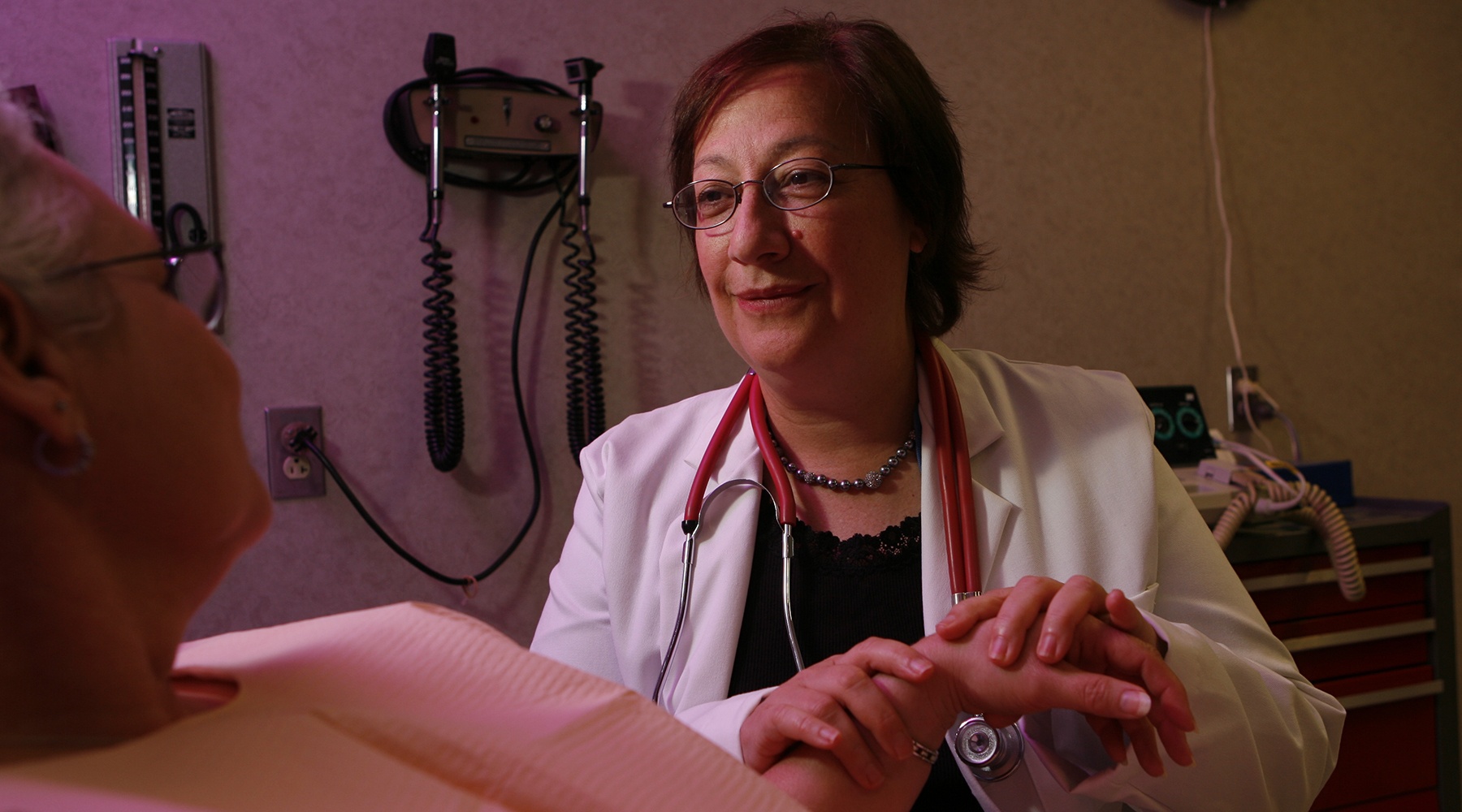Joan T. Merrill, M.D.
Professor
Arthritis & Clinical Immunology Research Program
OMRF Professor of Medicine, University of Oklahoma Health Sciences Center
Adjunct Professor, School of Pharmacy, University of Oklahoma Health Sciences Center
My 101
Lupus is a chronic autoimmune disease that can cause unpredictable flares of inflammation affecting almost any organ in the body. Although this illness can be relatively mild in many people, in others it can become quite severe or even life threatening, causing serious damage to the kidneys, heart, brain or lungs.
In our research group, we view lupus as an imbalance of the immune system rather than the immune system as some kind of enemy to a lupus patient. It’s there to defend us, not to attack us, but somehow, in lupus, it has become overactive in its defense, leading to excessive inflammation and collateral damage to the body.
The medicines used for lupus now work to suppress the immune system. But they also have unacceptable side effects and can impair the ability of the immune system to keep a person healthy, leading to serious infections and other unwanted consequences.
Instead, we’re looking for treatments that restore the balance of the immune system, such as new “biologic” treatments that can drill down and target even the tiny, individual proteins of the immune system, restoring its proper balance.
At OMRF, we run the Oklahoma Lupus Cohort—a group of more than 400 people with lupus who donate blood samples and clinical information for laboratory studies, so we can help develop new targeted treatments. We also do treatment studies for lupus patients who choose to participate in the testing of new biological agents. Some of the studies are very exciting, because they link laboratory studies with treatment assessments. Because people donate blood samples before, during and after the treatment, scientists can monitor the effects of the new treatments and learn more about the way the immune system actually works. And, because lupus is such a complicated disease, these studies may help to figure out which patients should be getting each specific treatment and what the best approach to dosing is.
Research
Heart attacks and strokes occur when fats slowly accumulate in blood vessels, causing breakdown of blood flow to arteries of the heart and brain. It is increasingly apparent that disorders in the regulation of inflammatory processes play a role in this accumulating process. Lupus is a disease characterized by flares of inflammation in the blood vessels, and lupus patients are at increased risk for premature atherosclerosis. The hypothesis underlying our work is that some of the specific disordered immune events that occur in lupus can shed light on the more low-grade inflammatory events that lead to progressive atherosclerosis in a wider, aging population.
Our research involves the study of variables that affect immune function and blood vessel regulation. We have three projects that follow patients over time: a national registry of the antiphospholipid syndrome, the SLICC registry, which studies risk factors for premature atherosclerosis (we are one of 30 sites around the world participating in this collaborative study), and basic research linked to pharmaceutical-sponsored clinical trials of investigational drugs for lupus.
Our group also does basic research into the ways in which lupus immune proteins interfere with structures that help maintain a healthy bloodstream. This includes antiphospholipid antibodies (which interfere with the blood clotting system), antibodies to proteins that regulate cholesterol and antibodies to other blood vessel regulators such as platelets.
The Clinical Pharmacology team works with several international groups to distill the complexities of lupus down to manageable and testable targets for new immune-modulating treatments. These projects range from the testing of updated disease criteria and clinical outcome measures (working with the Systemic Lupus International Collaborating Clinics) to the validation of improved biologic tests for determining the safety and effectiveness of investigational drugs. We have also developed projects which link pharmaceutical-sponsored drug trials in lupus to basic laboratory research studies. We have completed a recent study called Biomarkers of Lupus Disease (BOLD) which demonstrates the complexities of performing clinical trials with multiple background treatments being used and characterizes the immune interference of each of the most commonly used background treatments in these trials. We are currently studying dipyridamole and abatacept in trials of lupus that are capitalizing on information we learned from the BOLD study, trying to simplify background treatments and avoid the “noise” that interferes with figuring out how treatments work.
Brief CV
Education
B.A., Vassar College, Poughkeepsie, NY, 1972
M.D., Cornell University Medical College, New York, NY, 1985
Honors and Awards
Edmund Dubois Award, American College of Rheumatology, 2000
Ira Goldstein Award and Lectureship, New York University Advance Course in Rheumatology, 2006
Pemberton Award and Lecture, Philadelphia Rheumatism Society, 2010
Taiwan Rheumatism Association Award, 2014
PHRMA Research and Hope Award, 2016
Einbender Lecture University of Missouri, 2017
Lupus Foundation of America Evelyn V. Hess Award, 2020
Merrick Award for Outstanding Medical Research, OMRF, 2021
Other Activities
Chair, APLS Abstract Subcommittee, American College of Rheumatology Meeting, 1999-2002
Planning Committee, American College of Rheumatology Meeting, 1999-2002
Vice-Chair, Medical and Scientific Committee, N.Y. Chapter Arthritis Foundation, 2000-2001
Medical and Scientific Committee, National Arthritis Foundation, 2000-2003
Research Committee and Clinical Research Subcommittee, American College of Rheumatology, 2002-2004
Medical Director, Lupus Foundation of America, 2004-2016
Chief Advisor for Clinical Development, Lupus Foundation of America, 2016-present
Memberships
American College of Rheumatology
New York Academy of Science
The Henry Kunkel Society, elected 1998
Systemic Lupus International Collaborating Clinics, elected 1998
Joined OMRF scientific staff in 2001
Publications
Recent Publications
Askanase AD, D'Cruz D, Kalunian K, Merrill JT, Navarra SV, Cahuzac C, Cornelisse P, Murphy MJ, Strasser DS, Trokan L, Berkani O. Cenerimod, a sphingosine-1-phosphate receptor modulator, versus placebo in patients with moderate-to-severe systemic lupus erythematosus (CARE): an international, double-blind, randomised, placebo-controlled, phase 2 trial. Lancet Rheumatol, 2024 November, PMID: 39586304
Werth VP, Merrill JT, Furie R, Dörner T, van Vollenhoven R, Lipsky P, Weiswasser M, Korish S, Schafer PH, Stern M, Li S, Delev N. Effect of iberdomide on cutaneous manifestations in systemic lupus erythematosus: a randomized phase 2 clinical trial. J Am Acad Dermatol, 2024 October, PMID: 39461504
Anderson E, Powell M, Yang E, Kar A, Leung TM, Sison C, Steinberg R, Mims R, Choudhury A, Espinosa C, Zelmanovich J, Okoye NC, Choi EJ, Marder G, Narain S, Gregersen PK, Mackay M, Diamond B, Levy T, Zanos TP, Khosroshahi A, Sanz I, Luning Prak ET, Bar-Or A, Merrill J, Arriens C, Pardo G, Guthridge J, James J, Payne A, Utz PJ, Boss JM, Aranow C, Davidson A. Factors associated with immune responses to SARS-CoV-2 vaccination in autoimmune disease individuals. JCI Insight, 2024 June, PMID: 38833310, PMCID: PMC11383356
Selected Publications
Wallace DJ, Isenberg DA, Morand EF, Vazquez-Mateo C, Kao AH, Aydemir A, Pudota K, Ona V, Aranow C, Merrill JT. Safety and clinical activity of atacicept in the long-term extension of the Phase IIb ADDRESS II study in systemic lupus erythematosus. Rheumatology (Oxford). 2021 Feb 6: keab115. doi: 10.1093/rheumatology/keab115. PMID: 33547784
Merrill JT Systemic lupus erythematosus: diverting progress to chase rare side effects? Lancet Rheumatology 2021 DOI: https://doi.org/10.1016/S2665-9913(20)30391-X
Merrill JT What did not work? The drug or the trial? Arthritis & Rheumatism 2021 doi: 10.1002/art.41810. Online ahead of print. PMID: 34042321
Merrill JT, Erkan D, Winakur J, James JA Emerging Evidence of a COVID-19 Thrombotic Syndrome Has Treatment Implications Commentary Nature Reviews Rheumatology 2020 https://doi.org/10.1038/s41584-020-0474-5 PMID: 32733003, PMCID: PMC7391481
Morand EF, Isenberg DA, Wallace DJ, Kao AH, Vazquez-Mateo C, Chang P, Pudota K, Aranow C, Merrill JT. Attainment of treat-to-target endpoints in SLE patients with high disease activity in the atacicept phase 2b ADDRESS II study. Rheumatology (Oxford). 2020 Feb 27. pii: keaa029. doi: 10.1093/rheumatology/keaa029. [Epub ahead of print] PMID: 32107560, PMCID: PMC7516108
Merrill JT for lupus trials, the answer might depend on the question Lancet Rheumatology 2019 https://doi.org/10.1016/S2665-9913(19)30098-0
Contact
Clinical Pharmacology Research Program, MS 22
Oklahoma Medical Research Foundation
825 N.E. 13th Street
Oklahoma City, OK 73104
Phone: (405) 271-7805
Fax: (405) 271-8797
E-mail: Joan-Merrill@omrf.org
For media inquiries, please contact OMRF’s Office of Public Affairs at news@omrf.org.
News from the Merrill lab

March Today, just 1 in 5,000 experimental compounds proves safe and effective enough to reach patients. For new drugs, the road to hospitals and clinics is steep and long. Researchers screen countless promising compounds, but they choose only a few to begin clinical trials. Of those selected, roughly 9 out of 10 will fail. For that […]
Researchers at OMRF are looking for rheumatoid arthritis and lupus patients to take part in studies of new treatments for the diseases. OMRF’s Clinical Pharmacology Research Program conducts pharmaceutical studies on rheumatoid arthritis and lupus. “We are in a unique position here at OMRF in that we are able to conduct clinical trials that are […]
Scientists at the Oklahoma Medical Research Foundation are seeking rheumatoid arthritis patients to participate in one of several studies of new treatments for the disease. Rheumatoid arthritis is a chronic illness mainly characterized by inflammation of the lining of the joints. The symptoms include pain, swelling and stiffness in the joints and ultimately the disease […]
A pair of physician-scientists from the Oklahoma Medical Research Foundation presented papers at the 8th annual International Congress on Lupus in Shanghai, China, last week. OMRF’s Joan Merrill, M.D., and John Harley, M.D., Ph.D., each gave invited presentations at the four-day conference, which focuses on the autoimmune disease lupus. More than 1,500 researchers, clinicians, scientists, […]
The Lupus Foundation of America (LFA) has named Oklahoma Medical Research Foundation scientist Joan Merrill, M.D., as the organization’s first Medical Director. Merrill will continue to serve as head of the Clinical Pharmacology Research Program at OMRF, one of the country’s leading centers for lupus research. Merrill received her undergraduate degree from Vassar College and […]
































